The outlook for the automotive industry is starting to look increasingly dim, automakers frantically searching for a way to respond to the Trump administration’s broad tariff on imported autos and auto parts. The question is whether to raise prices and risk a sharp slump in sales or absorb tariffs and crash earnings.
Despite all the typical bravado found at auto shows when makers roll out their latest products, there was a much more somber tone underlying this week’s New York International Auto Show. The general sense is that U.S. sales are heading for a sharp plunge for the rest of this year, according to senior officials from a number of manufacturers — most requesting anonymity, as one said, “to avoid provoking the bear” by seeming to challenge the Trump administration.
Recent reports have taken on an increasingly dire tone, one from Telemetry Research forecasting U.S. car sales could end 2025 down 1.8 million vehicles from 2024, while most of those who spoke to Headlight.News in New York said that they anticipated a decline of at least 1 million if the auto tariffs aren’t dropped.
The latest warning came from Wedbush Securities which sent a note to investors this week, saying that the president’s “head-scratching tariff slate” could result in a 15-20% reduction in demand for new auto purchases in the U.S. in 2025.
U.S.-made car is a chimera.
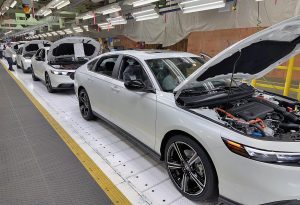
Even vehicles, like this Honda on the line at a plant in Marysville, Ohio, rely heavily on imported parts and components.
“We reiterate the concept of a U.S.-made car with all U.S. parts is a fairy tale fictional narrative,” Dan Ives and other Wedbush analysts wrote. “This auto tariff (in its current form) will send the auto industry into upside down mode and raise the average price of cars between $5,000 on the low end and $10,000 to $15,000 on the high end.”
The analysts pointed out that manufacturers that make their vehicles in the U.S. import a large portion of their parts from abroad and therefore won’t be able to avoid the tariffs.
Tariffs already have been attached to steel and aluminum, the basic material used in vehicles, while the Trump administration is also threatening to levy new tariffs on semiconductors, which are essential to the electronics widely used in modern cars and trucks.
Ives, who has long championed Tesla, noted, “While Tesla is in a much better situation, relatively speaking, the auto tariffs are a complicating factor that could disrupt the supply chain and add cost inputs at a time Tesla and Musk are trying to balance its operations globally.”
Consumer confidence is crashing
Meanwhile, consumer sentiment, a key factor in sales of new vehicles, fell for the fourth straight month, plunging 11% from March, according to the University of Michigan.
U-M Surveys of Consumers Director Joanne Hsu said this decline was, like the last month’s results, pervasive and unanimous across age, income, education, geographic region, and political affiliation. Sentiment has now dropped more than 30% since December 2024 amid growing worries about trade war developments that have oscillated over the course of the year.
Consumers point out multiple warning signs that raise the risk of recession: expectations for business conditions, personal finances, incomes, inflation, and labor markets all continued to deteriorate this month, Hsu said.
More Automotive News
- Trump Pauses Most Tariffs – But Leaves Auto Sanctions in Place
- Mexican Plants Still Humming, Despite Tariffs
- Trump Threatens Automakers Who Would Pass Tariffs Cost Onto Consumers
Unemployment on the rise
Additionally, the share of consumers expecting unemployment to rise in the year ahead increased for the fifth consecutive month and is now more than double the November 2024 reading and the highest since 2009, U-M noted.
“This lack of labor market confidence lies in sharp contrast to the past several years, when robust spending was supported primarily by strong labor markets and incomes,” Hsu said.
Fear of inflation showing up in polling
Fear of inflation and rising prices from the Trump administration’s chaotic and confusing rollout of tariffs also is taking its toll on public opinion.
A new CBS News survey of 2,410 Americans found a 44% approval of Trump’s handling of the economy, according to those polled. The administration’s handling of inflation was given a thumbs-up by 40%. But both those figures were down by 4 points from a March 30 poll. The president’s overall approval rating, meanwhile, dropped to 47% this month, down from 50% in March and 53% in February.
There are other signs of trouble, Bank of America observed in a new note on economic conditions released this week thar the import content of consumer goods and services is substantial, raising the risk of price rises from higher tariffs.
“In Bank of America data, we find some evidence that consumers were buying durables ahead of the introduction of tariffs. The evidence is strongest in autos sales,” the Bank said.
Higher-income households continued to show stronger spending growth than lower-income households, which is consistent with their stronger after-tax wages and salaries growth. Tax refunds are slightly higher than last year, but currently skew a little toward lower- and middle-income households.
Paul A. Eisenstein contributed to this report.


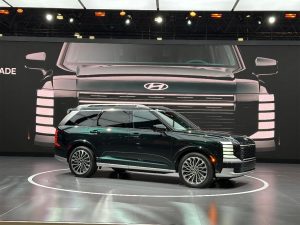



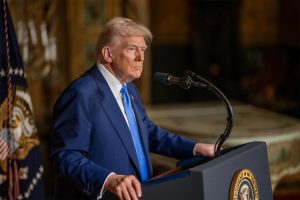
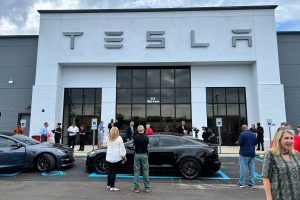
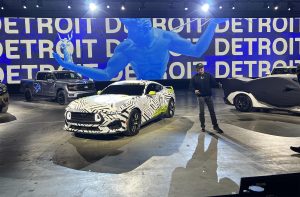

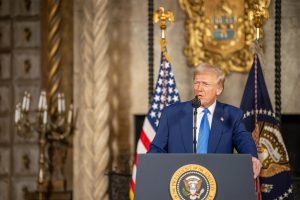

0 Comments